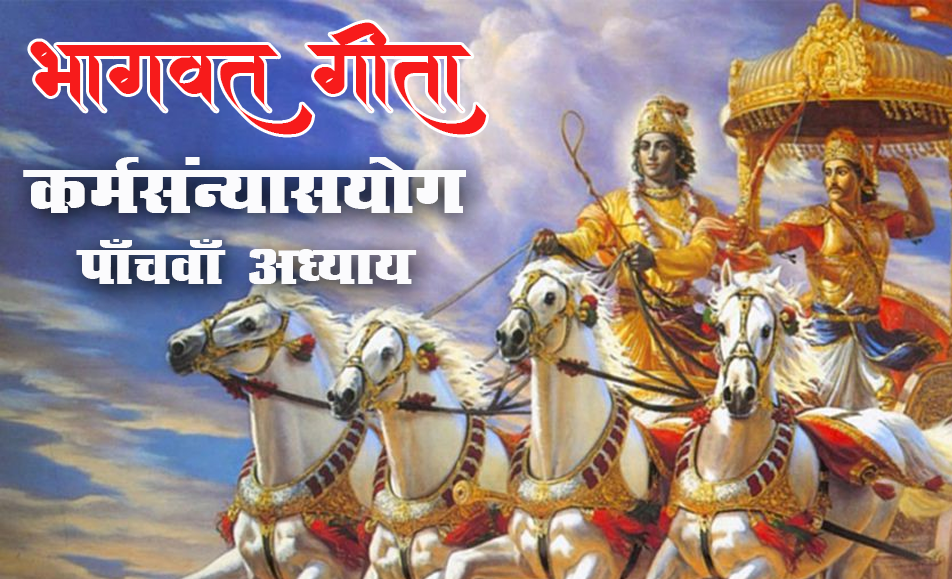ॐ तत्सदिति श्रीमद्भगवद्गीतासूपनिषत्सु ब्रह्मविद्यायां योगशास्त्रे
श्रीकृष्णार्जुनसंवादे कर्मसंन्यासयोगो नाम पंचमोऽध्यायः ॥5॥
(सांख्ययोग और कर्मयोग का निर्णय )
Chapter V – The Bhagawad Gita
अर्जुन उवाच- सन्न्यासं कर्मणां कृष्ण पुनर्योगं च शंससि । यच्छ्रेय एतयोरेकं तन्मे ब्रूहि सुनिश्चितम् ॥
Arjun said: O Shree Krishna, You praised karm sanyās (the path of renunciation of actions), and You also advised to do karm yog (work with devotion). Please tell me decisively which of the two is more beneficial?
श्रीभगवानुवाच-सन्न्यासः कर्मयोगश्च निःश्रेयसकरावुभौ ।तयोस्तु कर्मसन्न्यासात्कर्मयोगो विशिष्यते ॥
The Supreme Lord said: Both the path of karm sanyās (renunciation of actions) and karm yog(working in devotion) lead to the supreme goal. But karm yog is superior to karm sanyās.
ज्ञेयः स नित्यसन्न्यासी यो न द्वेष्टि न काङ्क्षति । निर्द्वन्द्वो हि महाबाहो सुखं बन्धात्प्रमुच्यते ॥
The karm yogis, who neither desire nor hate anything, should be considered always renounced. Free from all dualities, they are easily liberated from the bonds of material energy.
साङ्ख्ययोगौ पृथग्बालाः प्रवदन्ति न पण्डिताः । एकमप्यास्थितः सम्यगुभयोर्विन्दते फलम् ॥
Only the ignorant speak of sānkhya (renunciation of actions, or karm sanyās) and karm yog (work in devotion) as different. Those who are truly learned say that by applying ourselves to any one of these paths, we can achieve the results of both.
यत्साङ्ख्यैः प्राप्यते स्थानं तद्यौगैरपि गम्यते । एकं साङ्ख्यं च योगं च यः पश्यति स पश्यति ॥
The supreme state that is attained by means of karm sanyās is also attained by working in devotion. Hence, those who see karm sanyās and karm yog to be identical, truly see things as they are.
सन्न्यासस्तु महाबाहो दुःखमाप्तुमयोगतः । योगयुक्तो मुनिर्ब्रह्म नचिरेणाधिगच्छति ॥
Perfect renunciation (karm sanyās) is difficult to attain without performing work in devotion (karm yog), O mighty-armed Arjun, but the sage who is adept in karm yog quickly attains the Supreme.
( सांख्ययोगी और कर्मयोगी के लक्षण और उनकी महिमा ) योगयुक्तो विशुद्धात्मा विजितात्मा जितेन्द्रियः । सर्वभूतात्मभूतात्मा कुर्वन्नपि न लिप्यते ॥
The karm yogis, who are of purified intellect, and who control the mind and senses, see the Soul of all souls in every living being. Though performing all kinds of actions, they are never entangled.
नैव किंचित्करोमीति युक्तो मन्येत तत्ववित् । पश्यञ्श्रृण्वन्स्पृशञ्जिघ्रन्नश्नन्गच्छन्स्वपंश्वसन् ॥
Those steadfast in this karm yog, always think, “I am not the doer,” even while engaged in seeing, hearing, touching, smelling, moving, sleeping, breathing, speaking, excreting, and grasping, and opening or closing the eyes.
प्रलपन्विसृजन्गृह्णन्नुन्मिषन्निमिषन्नपि ॥ इन्द्रियाणीन्द्रियार्थेषु वर्तन्त इति धारयन् ॥
With the light of divine knowledge, they see that it is only the material senses that are moving amongst their objects.
ब्रह्मण्याधाय कर्माणि सङ्गं त्यक्त्वा करोति यः । लिप्यते न स पापेन पद्मपत्रमिवाम्भसा ॥
Those who dedicate their actions to God, abandoning all attachment, remain untouched by sin, just as a lotus leaf is untouched by water.
कायेन मनसा बुद्धया केवलैरिन्द्रियैरपि ।योगिनः कर्म कुर्वन्ति संग त्यक्त्वात्मशुद्धये ॥
The yogis, while giving up attachment, perform actions with their body, senses, mind, and intellect, only for the purpose of self-purification.
युक्तः कर्मफलं त्यक्त्वा शान्तिमाप्नोति नैष्ठिकीम् । अयुक्तः कामकारेण फले सक्तो निबध्यते ॥
Offering the results of all activities to God, the karm yogis attain everlasting peace. Whereas those who, being impelled by their desires, work with a selfish motive become entangled because they are attached to the fruits of their actions.
( ज्ञानयोग का विषय ) सर्वकर्माणि मनसा संन्यस्यास्ते सुखं वशी । नवद्वारे पुरे देही नैव कुर्वन्न कारयन् ॥
The embodied beings who are self-controlled and detached reside happily in the city of nine gates, free from thinking they are the doers or the cause of anything.
न कर्तृत्वं न कर्माणि लोकस्य सृजति प्रभुः । न कर्मफलसंयोगं स्वभावस्तु प्रवर्तते ।
Neither the sense of doership nor the nature of actions comes from God; nor does He create the fruits of actions. All this is enacted by the modes of material nature (guṇas).
नादत्ते कस्यचित्पापं न चैव सुकृतं विभुः । अज्ञानेनावृतं ज्ञानं तेन मुह्यन्ति जन्तवः ॥
The omnipresent God does not involve Himself in the sinful or virtuous deeds of anyone. The living entities are deluded because their inner knowledge is covered by ignorance.
ज्ञानेन तु तदज्ञानं येषां नाशितमात्मनः । तेषामादित्यवज्ज्ञानं प्रकाशयति तत्परम् ॥
But for those, in whom this ignorance of the self is destroyed by divine knowledge, that knowledge reveals the Supreme Entity, just as the sun illumines everything in daytime.
तद्बुद्धयस्तदात्मानस्तन्निष्ठास्तत्परायणाः । गच्छन्त्यपुनरावृत्तिं ज्ञाननिर्धूतकल्मषाः ॥
Those whose intellect is fixed in God, who are wholly absorbed in God, with firm faith in Him as the supreme goal, such persons quickly reach the state from which there is no return, their sins having been dispelled by the light of knowledge.
विद्याविनयसम्पन्ने ब्राह्मणे गवि हस्तिनि । शुनि चैव श्वपाके च पण्डिताः समदर्शिनः ॥
The truly learned, with the eyes of divine knowledge, see with equal vision a Brahmin, a cow, an elephant, a dog, and a dog-eater.
इहैव तैर्जितः सर्गो येषां साम्ये स्थितं मनः । निर्दोषं हि समं ब्रह्म तस्माद् ब्रह्मणि ते स्थिताः ॥
Those whose minds are established in equality of vision conquer the cycle of birth and death in this very life. They possess the flawless qualities of God, and are therefore seated in the Absolute Truth.
न प्रहृष्येत्प्रियं प्राप्य नोद्विजेत्प्राप्य चाप्रियम् । स्थिरबुद्धिरसम्मूढो ब्रह्मविद् ब्रह्मणि स्थितः ॥
Established in God, having a firm understanding of divine knowledge and not hampered by delusion, they neither rejoice in getting something pleasant nor grieve on experiencing the unpleasant.
बाह्यस्पर्शेष्वसक्तात्मा विन्दत्यात्मनि यत्सुखम् । स ब्रह्मयोगयुक्तात्मा सुखमक्षयमश्नुते ॥
Those who are not attached to external sense pleasures realize divine bliss in the self. Being united with God through Yog, they experience unending happiness.
ये हि संस्पर्शजा भोगा दुःखयोनय एव ते । आद्यन्तवन्तः कौन्तेय न तेषु रमते बुधः ॥
The pleasures that arise from contact with the sense objects, though appearing as enjoyable to worldly-minded people, are verily a source of misery. O son of Kunti, such pleasures have a beginning and an end, and so the wise do not delight in them.
शक्नोतीहैव यः सोढुं प्राक्शरीरविमोक्षणात् । कामक्रोधोद्भवं वेगं स युक्तः स सुखी नरः ॥
Those persons are yogis, who before giving up the body are able to check the forces of desire and anger; and they alone are happy.
योऽन्तःसुखोऽन्तरारामस्तथान्तर्ज्योतिरेव यः । स योगी ब्रह्मनिर्वाणं ब्रह्मभूतोऽधिगच्छति ॥
Those who are happy within themselves, enjoying the delight of God within, and are illumined by the inner light, such yogis are united with the Lord and are liberated from material existence.
लभन्ते ब्रह्मनिर्वाणमृषयः क्षीणकल्मषाः । छिन्नद्वैधा यतात्मानः सर्वभूतहिते रताः ॥
Those holy persons, whose sins have been purged, whose doubts are annihilated, whose minds are disciplined, and who are devoted to the welfare of all beings, attain God and are liberated from material existence.
कामक्रोधवियुक्तानां यतीनां यतचेतसाम् । अभितो ब्रह्मनिर्वाणं वर्तते विदितात्मनाम् ॥
For those sanyāsīs, who have broken out of anger and lust through constant effort, who have subdued their mind, and are self-realized, liberation from material existence is both here and hereafter.
( भक्ति सहित ध्यानयोग का वर्णन )स्पर्शान्कृत्वा बहिर्बाह्यांश्चक्षुश्चैवान्तरे भ्रुवोः ।प्राणापानौ समौ कृत्वा नासाभ्यन्तरचारिणौ ॥
Shutting out all thoughts of external enjoyment, with the gaze fixed on the space between the eye-brows, equalizing the flow of the incoming and outgoing breath in the nostrils,
यतेन्द्रियमनोबुद्धिर्मुनिर्मोक्षपरायणः । विगतेच्छाभयक्रोधो यः सदा मुक्त एव सः ॥
and thus controlling the senses, mind, and intellect, the sage who becomes free from desire and fear, always lives in freedom.
भोक्तारं यज्ञतपसां सर्वलोकमहेश्वरम् । सुहृदं सर्वभूतानां ज्ञात्वा मां शान्तिमृच्छति ॥
Having realized Me as the enjoyer of all sacrifices and austerities, the Supreme Lord of all the worlds and the selfless Friend of all living beings, My devotee attains peace.


